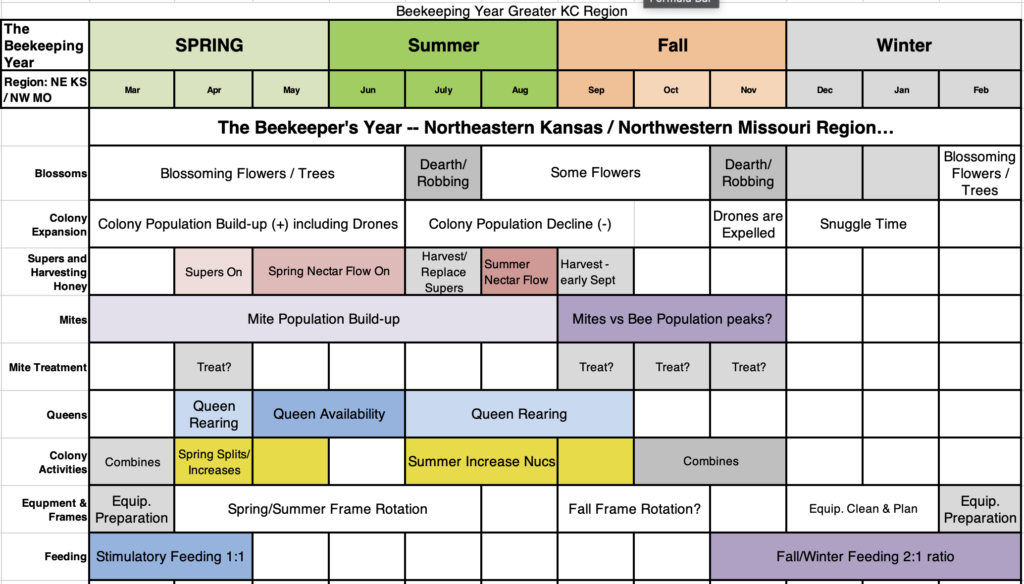
NE Kansas Beekeeper’s Year. Timely tasks for our beekeeping region.
Reply


Many new beekeepers are interested in queens and eventually they want to learn how to rear their own.
I’ve listed here beekeeping equipment, equipment that I recommend for queen rearing, and some graphs for learning bee biology (egg, larva, pupa, adult) development stages. It’s essential that anyone learning about queen rearing understand the development stages of the honey bee to understand colony growth and life cycle of each caste. The egg stage lasts about 3 days. The development rates vary between queen, worker, and drone. Queen and worker bees are female, and develop from a fertilized egg. Drones develop from an unfertilized egg, and take the longest to develop.
Additional documents are provided for educational and personal use. Best wishes in your queen rearing.
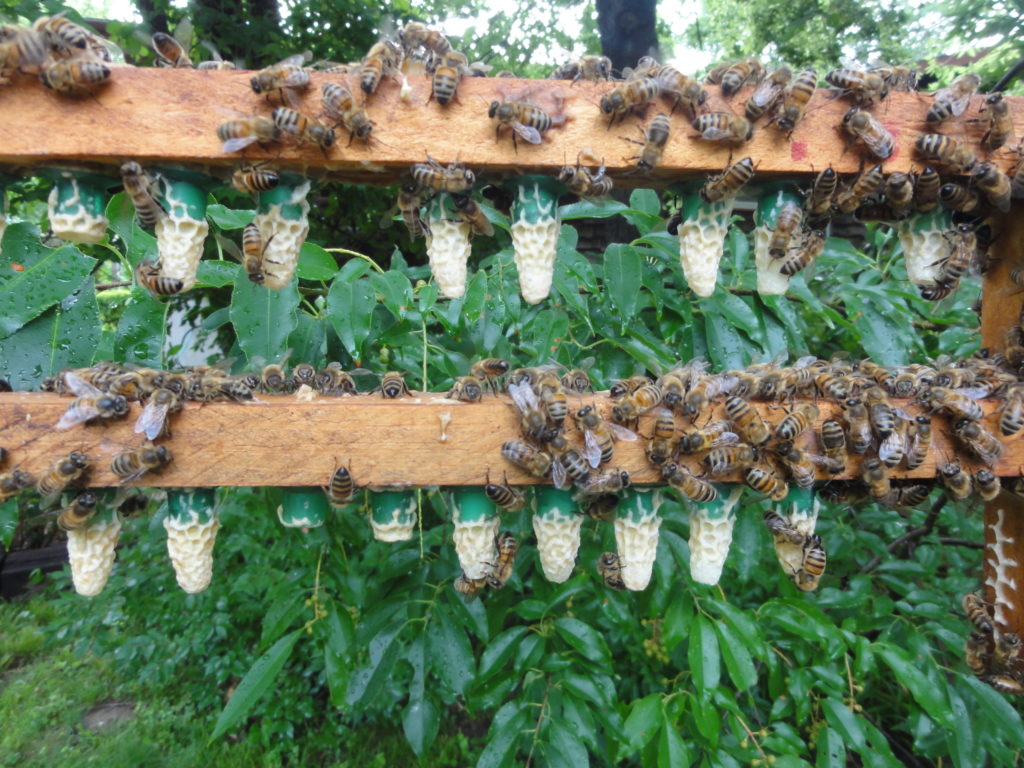
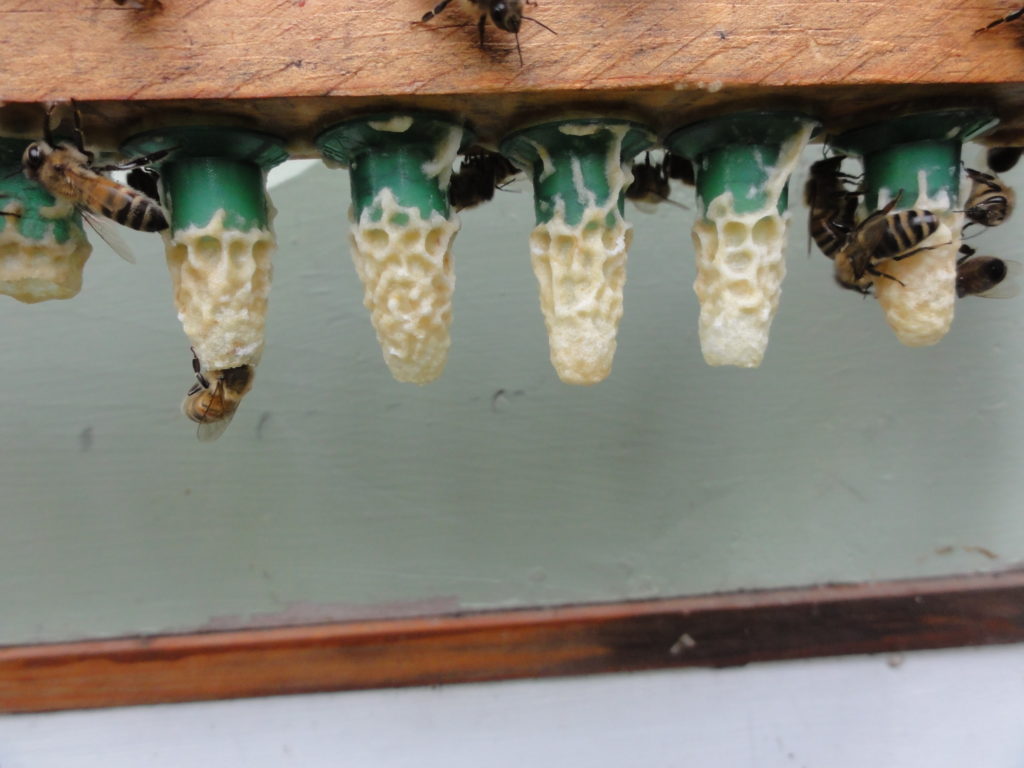
Queen Rearing Supplies – Dadant.com
Beekeeping Supplies – Local from Beekeepers.com
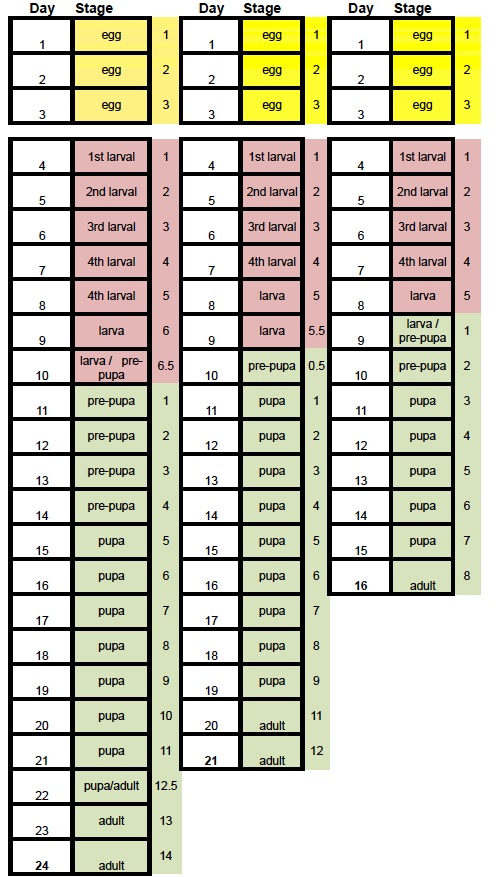
University of Arkansas – Queen Rearing Brochure “Raising Quality Queens”
Manage Bees for increase. As the hive’s keeper, you are the manager and will have to make crucial decisions regarding the colony’s future.
Controlled Queen Rearing to Raise European Honey Bee (EHB) Queens
In June of 2005, I went to Meade, NE for a Queen Rearing Workshop, taught by Dr. Marla Spivak and Gary S. Reuter. This page represents a list of notes and a table. I raised queens in the Fall of 2005 and during 2006 with great fun and success as well as some failure(s).
There are three critical essentials to raising 1 or 100 queens
Mating – improve the odds that reared queens will mate with drones from hives of desirable traits.
Controlled Queen rearing has 3 parts to the operation
Preparation – getting the cell-raising colony in the right condition to raise the queens.
Cell raising – raising the cells you want.
Completion – making nuclei, installing the cells and re-uniting the colony.
Drone Raising
Queen Rearing
Specialty of beekeeping.
In the foot-steps of Langstroth, Quinby, A.I. Root, and Doolittle.
What do we know about the production of queens?
Scientific fundamentals must be observed by anyone attempting to raise queens.
Queens are raised only from fertilized eggs [eggs that produce female bees],
Natural rearing conditions.
Methods vary:
Most common method used by commercial queen producers today is the Doolittle Method.
This method will be explained in Applied Queen Rearing.
INTRODUCTION TO APPLIED QUEEN REARING
Why queens should be reared?
The inherited and physical qualities of a queen are transmitted to the colony. The characteristics that we like to see are produced by superior queens by breeding these characteristics into stock. When one finds superior queens, every attempt should be made to propagate that stock. This is something all beekeepers can do to improve their own stock.
Other reasons would be to have a few on hand for replacement of old or failing queens or even queenless hives.
Queens raised from superior stock even by the hobbyist can be better than the stock sold.
Or raise your own queens just for the experience of it.
Or you might want to replace all of your queen each year by raising new queens to replace all your old queens and requeen each fall rather than in the spring.
Also, natural queen cells produced under the swarming impulse can be cut carefully from the comb and then used to raise more queens. If the stock is good, you can have no finer queens that those produced under the swarming impulse.
Doolittle Method of Raising Queens
Grafting procedure:
Prepare a grafting bar with cell cups.
made of wax –but plastic is becoming quite popular with commercial producers of queens.
Selecting the right larva becomes the next task for the person doing the grafting.
Grafting is usually more successful if the cell cups are primed with royal jelly and the new larva is placed on a pool of royal jelly.
“Dry” grafting is placing the larvae into a cell cup with only the royal jelly picked up with the larvae from its own cell.
Cell cups need to be warm and clean before placing larvae in them.
The location of the grafting room is important.
Good light is necessary as are the right temperature and moisture conditions.
Careful consideration of the right temperature, light, and moisture conditions will improve grafting result.
Once larva have been transferred into the queen cell cups, the bars are covered with a moist cloth and kept warm until they are given to a cell building colony.
As soon as a frame of 30 to 50 cells are grafted, it is immediately inserted into the cell builder.
Young nurse bees will visit the cell almost immediately and if accepted will start feeding the young larva.
Practice will increase speed and skill in grafting
Time is critical in raising queens.
The sooner a larvae can be grafted and provided with royal jelly and over a longer period of time that food is continued, the larger and better developed will be the resulting queen.
When raising queens there is no such thing as a vacation or rain day off.
A calendar is kept to chart the progress of each graft.
If a mistake is made in removing cells from a cell building hive, emerging queens will hatch and cut down cells of other queens and fight among themselves until only one survives.
All the work and effort to raise a number of good queens goes down the drain.
As a result every operation is scheduled exactly so that queen larvae is grafted on certain days, frames with cells are removed on certain days, and nuc’s are prepared for taking queen cells on certain days.
To check your understanding of this concept, lets assume that we graft for queen cells on June 1.
Handling queen cells
Queen cells are fragile.
They should never be shaken.
They must be protected from cold chills.
Chilled cells one day before the queen emerges usually result in queens born without fully developed wing.
On the other hand, they should not be exposed to high temperatures such as that found in the cab of a truck during mid summer.
The normal surrounding temperature of developing queen cells in a hive is near 92 degrees F.
If you are using the grafting method to produce queen cells, the following procedure should be used.
The queen cell bar must be handled gently.
The bees on the cell bar need to be brushed off carefully. Never shake.
Queen cells can be removed from the wooden bar.
Always hold the queen cell by its base.
Queen cells removed in a towel and covered over for protection.
Queen cells can lay on their sides for a short period of time without damage.
A queen cell needs to be placed into a queenless nuc or hive as soon as possible before a queen emerges from her cell.
Commercial beekeepers often have a device for holding queen cells in the normal down position and a carrier to keep them warm.
For any extended period of time (several hours), a queen-cubator with some water works well.
The cells are placed into the warmer and carried about in the nuc yard until they are all installed into the nucs. I have transported queen cells in Styrofoam cups before.
Getting Queen mating nuc’s ready:
Every queen to be produced must have her own hive. Commercial breeders may use a full deep hive body divided into four sections with special frames designed to fit the sections of the hive. Others use a single mating nuc of 3, 4, or 5 frames.
Each nuc is made up with a comb of honey if available and a feeder for syrup to feed the nuc. In addition an ideal nuc would also include a two frames of bees and some brood. It is important that enough bees be placed in the nuc to keep the cluster large enough to cover any brood placed in the nuc. A frame of new foundation could also be added.
Nuc’s must be attended to more often than full size hives.
As the queen begins to lay eggs, the nuc will quickly become crowded with little or no space for egg laying, honey storage, or pollen storage. If queens are not sold and the cycle of raising queens continued, the management of nucs requires attention to details such as moving the nuc into a larger size hive with more frames. Otherwise, your newly raised queens will swarm or abscond (leave) the nuc. The smaller the size of the nuc box, the greater the need to visit and check a queens progress.
Harvesting Queens
Queen should be laying before harvesting. Eggs should be placed uniformly at the bottom of the cells. It is best to watch the development of these eggs to make sure they are worker eggs rather than drone eggs.
Tested Queens vs Untested Queens
Untested: means that we do not know what her daughters are going to look like.
Queens sold as ‘Breeder queens’ on the other hand, have been observed to be 1) laying uniform patterns of brood, 2) the daughters seem to have been bred true to the race of the bee, 3) the queen producers is satisfied that the queen will produce young queens from her eggs that will have the characteristics similar to their mother.
Queen Cages
Some preparation is necessary. Decide on type of holding cage for the queen must be made.
Benton three hole cage. -usually have 6 to 10 attendant bees.
Newer methods – reduction in the weight of the queen cage. Development of the battery box to ship,
The California cage is made of wood like the benton cage. -does not have attendant bees.
The EZ-BZ plastic cage. It is also a single compartment with a tube for queen cage candy on one end.
Bees can approach the queen from all sides because this cage allows direct contact from all sides except the candy end of the cage. Very popular among queen breeders because of its light weight, and labor saving value. It will also fits better between top bars even in a ten frame hive.
Sending queen in the mail:
Find a swarm of honey bees?? – Notify me via the contact form below.
Honey bees are a valuable asset, and a beekeeper would be able to give a swarm a good home with good care.
Before leaving the original colony, honey bees gorge on honey for the journey to move to a new home. Generally speaking, they not very defensive. However, they can be enticed to sting. Please, do NOT spray with poisons or try to kill them. Swarms are only in a temporary resting place until they rest enough to move on to their final destination.
Swarming activity is a very common occurrence in April and May. Many people find them in their yards on trees or bushes or other places. Swarms can be harmed by high winds, hail, and heavy rains as well as sometimes cold, freezing weather.
As a public service, and free of charge, I remove or pick-up your un-welcomed honey bee swarm! I am available in Johnson and Wyandotte, and counties in Kansas, as well as eastern Jackson and southern Platte counties in Missouri. I will even try to leave you with a small jar of honey for your effort. I have 50 (2022) years experience working with honey bees.
Find a swarm of honey bees?
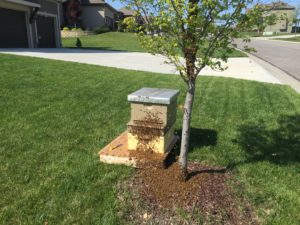
A swarm will usually move from the original location within 24 to 48 hours; therefore, if a beekeeper is not available to collect the bees from a homeowner’s property, the bees will normally leave without causing a problem.
Submit the ‘contact form’ below, and I will receive immediate notification via email through my mobile device. I’ll be in touch with you in short order. Thank you for your notification!
I will be in touch with you ASAP. If I am unable to come get the swarm, I will pass on the information to another beekeeper who can be of help. For swarms in other areas of Kansas outside of my region, please use this list from the NEKBA or Kansas State University link for a list of other beekeepers throughout Kansas that are also looking for a swarm.
As a disclaimer, I cannot assume responsibility related to the swarm collection or extraction activity, and I shall be held harmless for any actions or activities related to any honey bee collection, including but not limited to information used, liabilities, or resultant damages, injuries, or bodily harm that might occur. Thank you!
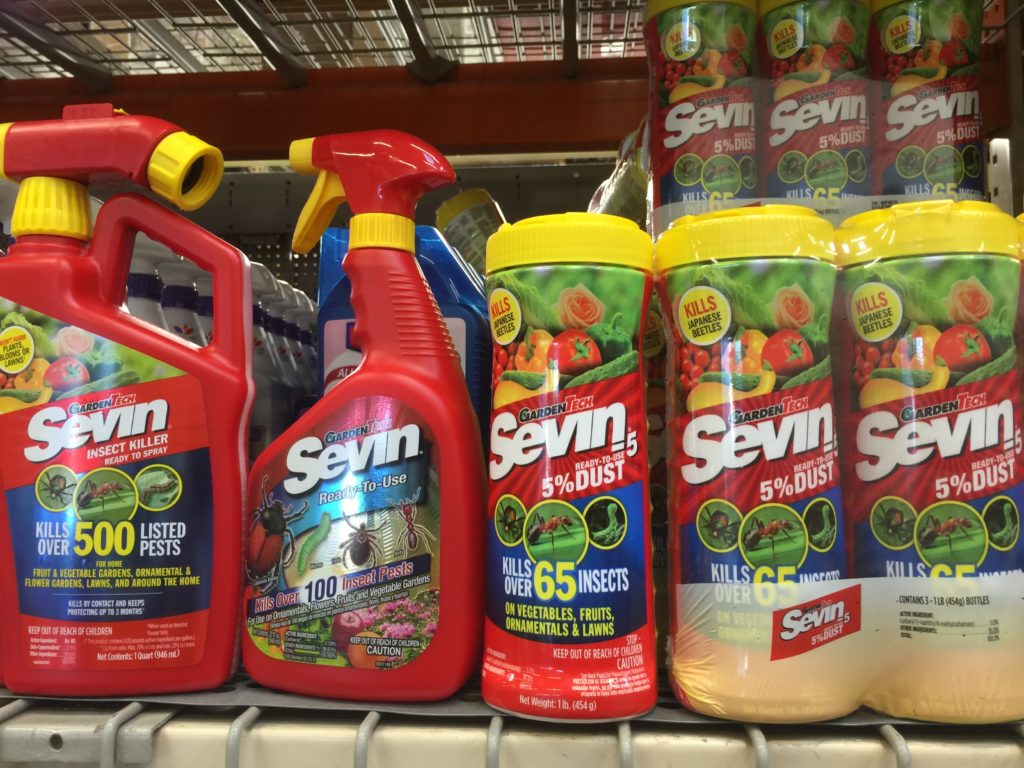
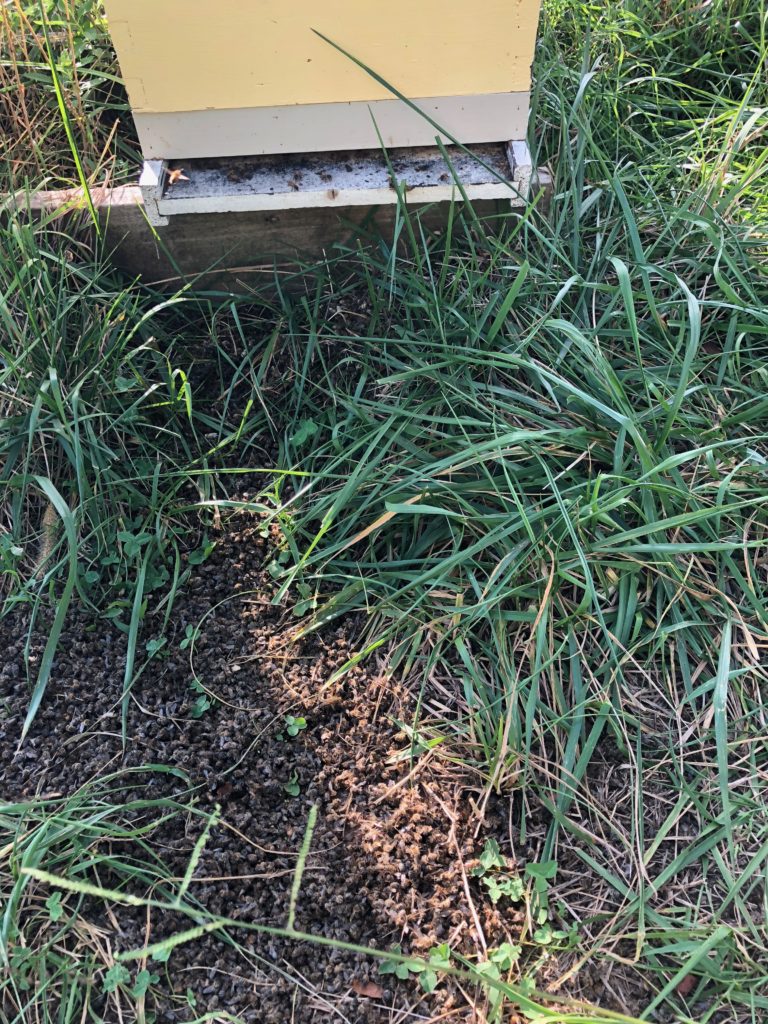
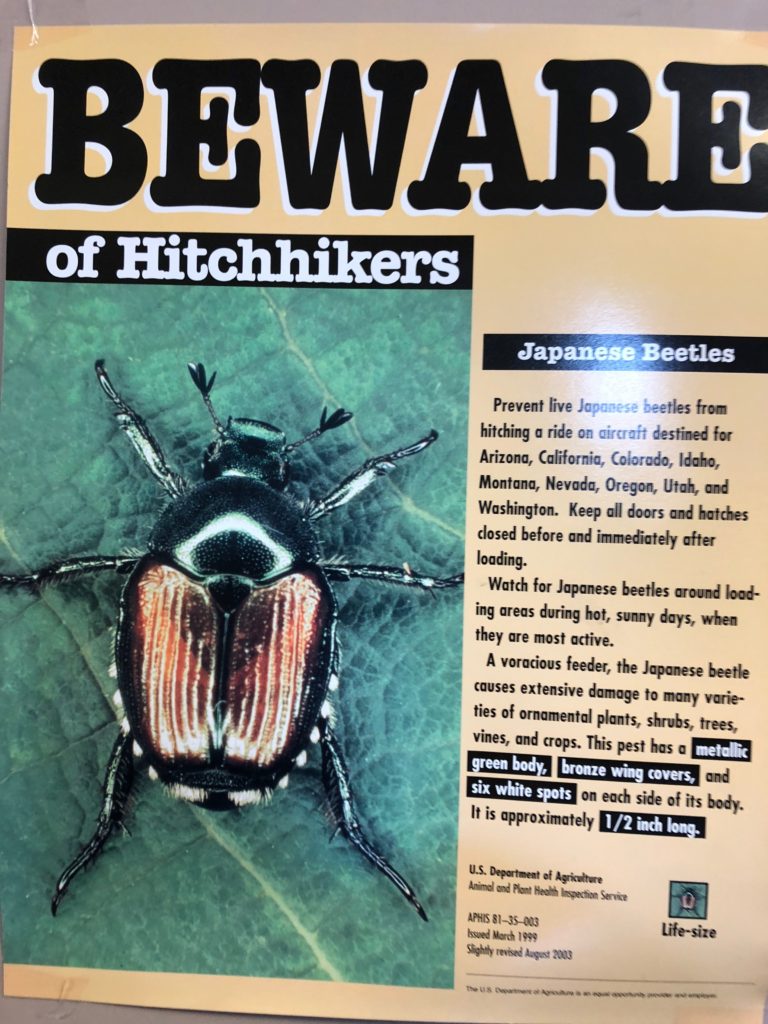
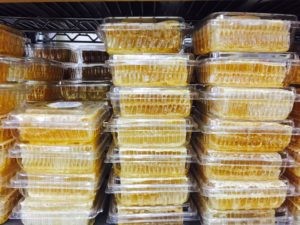 COMB HONEY is the Goal for 2018 – make more COMB HONEY !!
COMB HONEY is the Goal for 2018 – make more COMB HONEY !!
I had an idea last fall to make it a 2018 goal to produce more comb honey. This is my curious idea for comb honey production for 2018. My idea is to use large primary swarms to effortlessly produce comb. And then, rather serendipitously, I stumbled upon, an old ABJ article from 2003 that gave me even more information on the subject. Below are some of the details.
Short and sweet, I am putting this 2018 goal out there this year, will update you on how it goes with a process report or two.
The idea is to hive a swarm on foundation only – no drawn comb what-so-ever– with an excluder over the brood nest area and two comb honey supers over that.

It will be essential: Use only large primary swarms. I will not using small swarms or 2ndary swarms that may have any virgin queens. Here’s the concept of how this works:
Drawn comb would only entice the bees to settle down to building a good brood nest. So, using any drawn comb would be out of the question.
Here’s the concept: If the new hive contains only foundation, then the swarm is eager to build comb throughout the entire hive and not just around the brood area. The bees won’t just be distracted to building comb for brood. They will build it for nectar/honey storage, too. This is the goal for making comb honey for 2018. I’ll let you know how it works out in July 2018.
But first, I’ll need to keep a few comb honey supers on hand – to be prepared and ready. I already have them purchased and put together. Now, I’m ready to prime & paint when the weather warms up. Swarming season for us starts generally around April 10th.
UPDATE 18 May 2018
It’s been a rather slow season for swarms but I have managed to capture a few. The latest being a call from about 4 miles a way yesterday.
The nectar flow is on for May. Pictures below are of a swarm I caught in early May. They have drawn all 10 frames of the new foundation into comb and have it nearly full. I moved the frames into a super with 9-frame spacers in order for the bees to build out the combs further, and to provide stabilization for the frames when they are transported. I added another super of comb honey. I will continue to monitor on a weekly basis for comb building and the need for additional space.
UPDATE 30 August 2018
Supers were pulled in July and stored in a freezer until I was able to get with Kristi Sanderson, our KS State Fair Manager, to begin inspecting, cutting, and labeling. We had a very tough season with nearly 9 weeks of drought in 2018. Happy to report that I harvested 3 supers of comb honey. A fourth super was on a colony that perished sometime in June and that comb was lost. Still, with nearly 110+ containers of comb honey and two dozen pint jars of chunk honey (honey with comb in the jar), it was a great year for me to try this. Next year, we believe it would be much preferable to stick to only 10 frames per medium super and not worry about 9-frame, which might be too much and too thick for the containers. Very happy with the season’s product. 🙂
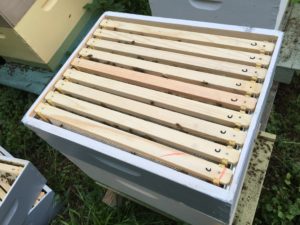
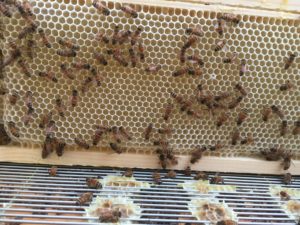
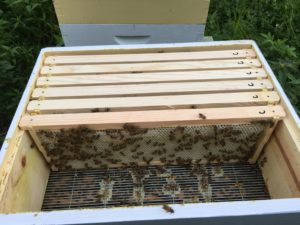
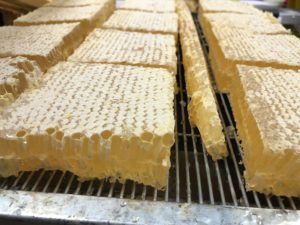
Looking for a Beekeeping Class for 2018?
The Northeastern Kansas Beekeepers Association (NEKBA) Bee Class (both part I & part II combined) is nearly 10 hours of education for new and those looking for a re-fresher in their early years of beginning beekeeping. Several courses will be presented by our keynote speaker, Dr. Dewey Caron, on the 2nd day or part II of the class. Included with each registration are presenter’s notes. Additional tag-along members or friends are welcome to attend for a nominal registration fee that also includes the presentation notebook. We are a non-profit organization. The fees cover the costs of rent, books and materials, as well as shared costs for our guest speaker.
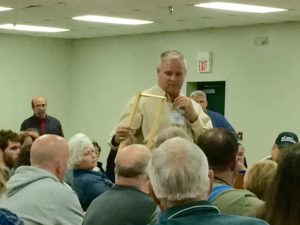
This event is for beginning & 2nd or even 3rd year
beekeepers or those looking for a re-fresher. We like to say that you’ll learn more the 2nd time around. The class is held on 2 weekends as there is much to offer. Trying to hit on all topics in 1 day is a lot to try to absorb. We want beekeepers to get the most and learn the best way possible.
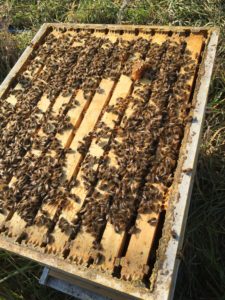
Our guest speakers will be Dr. Dewey Caron and Randy Oliver.
Dewey M. Caron is a graduate of Cornell University and Emeritus Professor from the University of Delaware. He has received numerous awards and forms of recognition for his teaching and extension work during his career. He has written many books and is one of our favorite guest. Some of his books are Honey Bee Biology and Beekeeping, Observation Hives-How to set up, maintain and open a window to the world of Honey Bees, Beekeeping Basics and Africanized Honey Bees in the Americas.
Randy Oliver owns and operates a small commercial beekeeping enterprise in the foothills of Grass Valley in Northern California. He and his two sons manage about 1000 colonies for migratory pollination, and produce queens, nucs, and honey. He has over 40 years of
Looking for a Beekeeping Class for 2017?
Our NEKBA Bee Class (both part I & part II combined) is nearly 10 hours of education for new and those looking for a re-fresher in their early years of beginning beekeeping. Several courses will be presented by our keynote speaker, Keith Delaplane, on the 2nd day or part II of the class. Keith’s book, a field guide, and presenter’s notes are included with each family registration. Additional family members or friends are welcome to attend for a nominal registration fee, which also includes the presentation notebook. We are a non-profit organizations. The fees are calculated to cover the costs of rent, books and materials, as well as shared costs for our keynote speaker.
This event is for beginning & 2nd or even 3rd year beekeepers or those looking for a re-fresher. We like to say that you’ll learn more the 2nd time around. The class is held on 2 weekends as there is much to offer and learn. Trying to hit on all topics in 1 day is a lot to try to absorb. We want beekeepers to get the most and learn the best way possible. Continue reading
Upcoming Activities
Northeastern Kansas Beekeeper’s Funday
Saturday, June 3rd, 2017 Registration: 7:45-8:45, Program 8:45-5:00
Douglas County Fairgrounds, 2110 Harper, Lawrence KS
Fee includes lunch, beverages, snacks, homemade honey ice cream, and a full day of fun!
Bring your hat & veil—we’ll be working through some hives
Cost: $40.00 per person for those pre-registered, $45.00 at the door. Walk-ins are welcome! We do appreciate pre-registrations as this helps with our planning for lunch and seating availability. For those pre-registered, by May 25th, there will be a drawing at the end of the event to reimburse 1 (one) pre-registered person for their registration! Children ages 6-18, $20.00 for those pre-registered, $25.00 at the door.
For those pre-registered (post marked), by May 25th, there will be a drawing at the end of the event to reimburse 1 (one) pre-registered person for their registration!
Click the following links (below) for information and registration. You can mail, if there is time. If not, print, complete, and bring it with you. See you in Lawrence, KS!
TO BE UPDATED IN EARLY 2017
fundayschedule2016 * Subject to change & pending update for 2017
Visit our website at nekba.org for other club information
Mating biology of honey bees (Apis mellifera), by Gudrun Koeniger and Nikolaus Koeniger with Jamie Ellis and Lawrence Connor
Wicwas Press
1 edition (December 22, 2014) Hardcover: 155 pages.
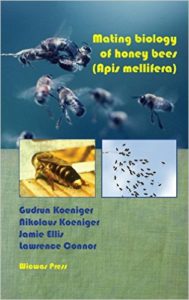 Review by Robert Burns
Review by Robert Burns
I just finished reading the book on honey bee mating biology. Wow! Although sex is usually a ‘hot’ topic, I can really appreciate the research and science that has gone into this work. The book has some excellent photographs and charts and diagrams. There’s lots of great science here that explains the bee mating biology in simple terms.
I don’t believe I have read any other book that is a better culmination of the works on the mating happenstances of our wonderfully under-appreciated honey bees. I have my other queen books Bee Sex and Queen Rearing and other guides. However, there hasn’t been quite any other that is more descriptive, especially of the 3rd caste –Drones. The male bees seem to never get enough attention and respect.